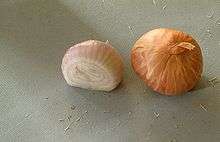cebola
Galician
Etymology
From Old Galician and Old Portuguese, from Latin cepulla, diminutive of Latin cēpa.
Pronunciation
- IPA(key): /θeˈβola̝/, (western) /sɛˈβɔla̝/
Audio (file)
Noun
cebola f (plural cebolas)
- onion
- 1347, M. Romaní Martínez (ed.), La colección diplomática de Santa María de Oseira (1025-1310):
- quinze restres de cebolas boas das que ouver en o dito casar de LXVIII cebolas a restre
- fifteen plaits of good onions, of the ones produced at that farm, each plait made with 68 onions
- quinze restres de cebolas boas das que ouver en o dito casar de LXVIII cebolas a restre
- 1347, M. Romaní Martínez (ed.), La colección diplomática de Santa María de Oseira (1025-1310):
Derived terms
- cebola das gaivotas
- cebola do mar
- ceboleiro
- ceboleta
- ceboliño
- cebolo
References
- “cebola” in Dicionario de Dicionarios do galego medieval, SLI - ILGA 2006-2012.
- “cebola” in Xavier Varela Barreiro & Xavier Gómez Guinovart: Corpus Xelmírez - Corpus lingüístico da Galicia medieval. SLI / Grupo TALG / ILG, 2006-2016.
- “cebola” in Dicionario de Dicionarios da lingua galega, SLI - ILGA 2006-2013.
- “cebola” in Tesouro informatizado da lingua galega. Santiago: ILG.
- “cebola” in Álvarez, Rosario (coord.): Tesouro do léxico patrimonial galego e portugués, Santiago de Compostela: Instituto da Lingua Galega.
Portuguese

cebola
Etymology
From Old Portuguese, from Latin cepulla, diminutive of Latin cēpa.
Pronunciation
- (Portugal) IPA(key): /seˈbolɐ/
Audio (file)
Noun
cebola f (plural cebolas)
- onion (a monocotyledonous plant of the genus Allium allied to garlic, used as a vegetable and a spice)
This article is issued from
Wiktionary.
The text is licensed under Creative
Commons - Attribution - Sharealike.
Additional terms may apply for the media files.